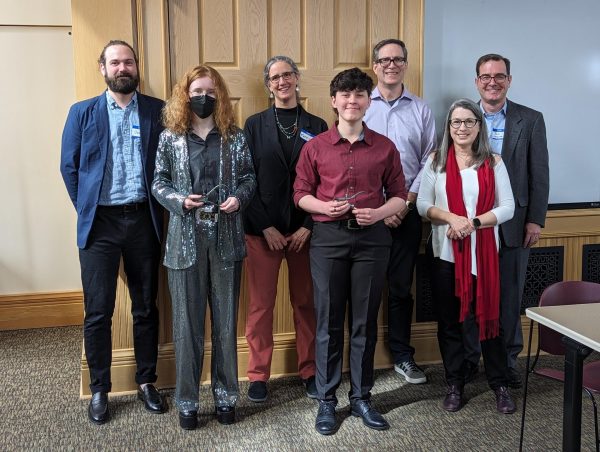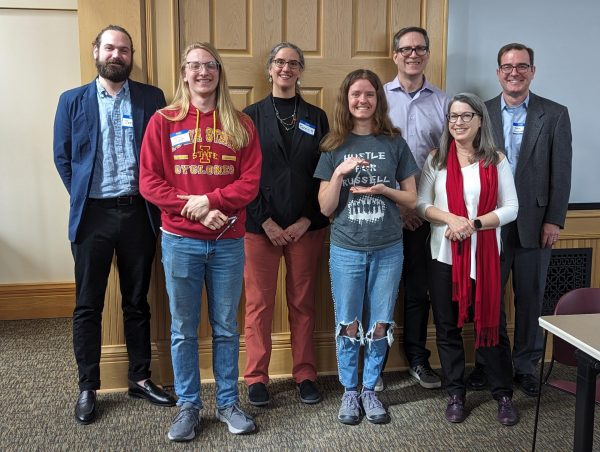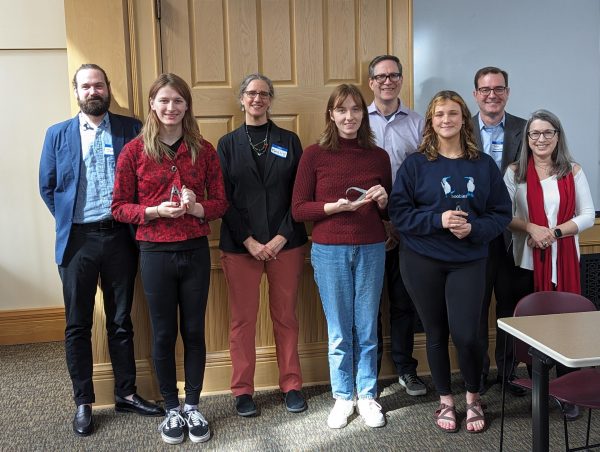Students use humanities, social science research to imagine game worlds shaped by AI
Author: Stacey Maifeld
Author: Stacey Maifeld
This spring semester, the Department of History and Department of English hosted an innovative world-building competition that challenged student teams to answer this question: “Can you imagine a future that includes AI?”
Students creatively used humanities and social science research to design a game world – a universe in which multiple narratives could unfold – set in an imagined future shaped by AI.
Professor of History John Monroe, who led the competition along with Kelli Fitzpatrick, graduate student in the Department of English, said the exercise gave students a chance to combine preparatory research with playfulness.
“The idea that sparked this whole thing for me was a teaching hypothetical: the thought that in some interesting ways, science fiction works like historical analysis in reverse,” Monroe said. “Thinking speculatively about the future involves a grasp of the ramifications of simultaneous processes of change over time that’s very similar to what historians bring to bear on the evidence they gather in their research process – only in the case of science fiction, the act of envisioning those processes of change leads the way, rather than deriving from empirical evidence.
My hope was that asking students to take a speculative leap grounded in preparatory research would give them a chance to play a bit, flexing some intellectual muscles that don’t necessarily get as much exercise in regular undergraduate history courses, where so much of the focus is – as it should be – on mastery of factual content. From the results, it’s pretty clear the experiment worked!”
The competition awarded a first prize of $750, a second prize of $250, and an honorable mention.
First prize winners Quinn Young, junior in aerospace engineering, and Lev Schaul, junior in computer science, designed a world called “Eikre” for their proposal. They imagined an AI that would spread virally into people’s brains, attempting to “optimize” them, but in practice stripping them of the unique qualities that make people human in the first place.

Lilah Hegarty, junior in English, and Ian Hutchison, graduate student in business administration, received second prize for their world, “Clerics of Europa.” Their proposal envisioned a distant future derived from a counter-factual past in which the Soviet Union achieved world domination in the 1950s. This, they imagined, would lead to the creation of an AI that would serve as a Marxist-Leninist “super-mind” that would eventually blur the lines between political ideology and religion.

Zara Babinat, senior in computer science; Emma Callaghan, senior in mechanical engineering; and Ashley Kleve, senior in environmental science, received an honorable mention for their proposal, “Bananas Republic,” which imagined a future Latin America transformed by AI-driven state surveillance and AI-intensified global economic inequality.

Entries were judged by an expert panel including Jeffrey Wheatley, assistant professor of philosophy and religious studies; Rachel Haywood, associate professor of world languages and cultures; Karen Menzel, program specialist in the Graduate College and local author; and Dallas Dickinson, a leading figure in the video game industry and executive producer and general manager of Crystal Dynamics.